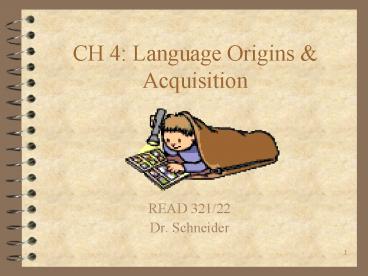CH 4: Language Origins PowerPoint PPT Presentation
1 / 13
Title: CH 4: Language Origins
1
CH 4 Language Origins Acquisition
- READ 321/22
- Dr. Schneider
2
OBJECTIVES You will learn
- how to define language
- what the essential components and functions of
language are - how the English language came to be so complex
3
Components Functions of Language
- Language is a system that helps us communicate
with each other orally, visually, and in print. - Each component has a function in context.
- A.Grammatically
- E.g., parts of speech NOUN can have the function
of a subject or an object - Subject The shoe is too tight. (WHO/WHAT
is/has/acts?) - Object I cant find my shoe!(WHAT can you not
find?)
4
Components Functions of Language
- B) Semantically-socially. According to
Halliday(70s/80s), we use language to - (1) satisfy needs INSTRUMENTAL FUNCTION
- (2) make individual statement PERSONAL
- (3) create imaginary environment IMAGINARY
- (4) give information to others INFORMATIVE
- (5) execute control REGULATORY
- (6) foster, facilitate social interaction
INTER- - ACTIONAL
- (7) explore reasons for environmental facts
- HEURISTIC
(p.119)
5
Components of Language
- Language contains a system of
- (1) SOUNDS gt Phonology
- English has 44 sounds that represent 26 letters
- Phonemes are smallest sound units in language
that differentiate meanings of words (P-et vs.
N-et) - (2) ARRANGEMENT gt Syntax
- Addresses the organization of words to produce
questions, exclamations
6
Components of Language
- (3) MEANING gt Semantics
- Addresses vocabulary prefixes-roots-suffixes
- Which are MORPHEMES,smallest units carrying
meaning - Addresses grammarPlural ending, tense endings
(-ed, -ing, -er, -est), also morphemes - Addresses homonyms, antonyms, synonyms,
connotations of words (context in which to use
them properly)
7
Components of Language
- (4) Arbitrary relationship of SOUND and PRINT
phonology-orthography - More than one print pattern can represent a
soundLong A-sound has 8 spellings (a, a-e, ai,
ay, eigh, ei, ey, ea), oy-sound has 2 spellings
(oi, -oy) - More than one sound can represent one print
pattern - (5) INTONATION to express meaning
- Anxiety, joy, sadness question, exclamation
8
Components of Language
- (6) PRAGMATICS gt choice of dialect, vocabulary,
intonation, non-verbal gestures that are
culturally appropriate for a situation to result
in a successful communication. - all verbal and non-verbal triggers one can pull
in an oral/written conversation to get what s/he
wants
9
Definition of Language
- There are MANY WAYS to define LANGUAGE.
- What is its overall purpose?
- How would you tell a child what it is?
10
Definition of Language
- How would you define language using your new
knowledge?
11
The Origin of English and its complexity
- The spelling system and vocabulary of English
reflect its history. - English has a very large vocabulary with distinct
CONNOTATIONS for words within a context (e.g.,
pretty, nice, handsome, cute) - The spelling system is very complex with up to 8
spellings per sound.gt non-transparent - BECCAUSE ENG IS A LINGUISTIC MELTING POT
12
The Origin of English and its complexity
- Main Influences during 4 periods
- PRE-HISTORIC VIKINGS (sk- words)
- OLD ENGLISH PERIOD(449-1066)
- GERMAN (basic Anglican vocabulary house, mother,
father, food, blood, brother, bread, milk, mouse,
cow) - ROMAN-GREEK (Roman Empire) (600BC)
- -tion, -sion, -cian words
- Prefix-root-suffix words
- Words with C inside pronounced as K
13
The Origin of English and its complexity
- MIDDLE ENGLISH PERIOD
- (1066-1500)
- FRENCH (Norman Conquest)
- Food and military vocabulary, lots of todays
non-phonetic words (menu, colonel) - MODERN ENGLISH PERIOD w/ Shakespeare
(1500-present) - Spanish (fiesta), Italian (pizza,
- German (philosophy zeitgeist, psychology angst,
kindergarten)

